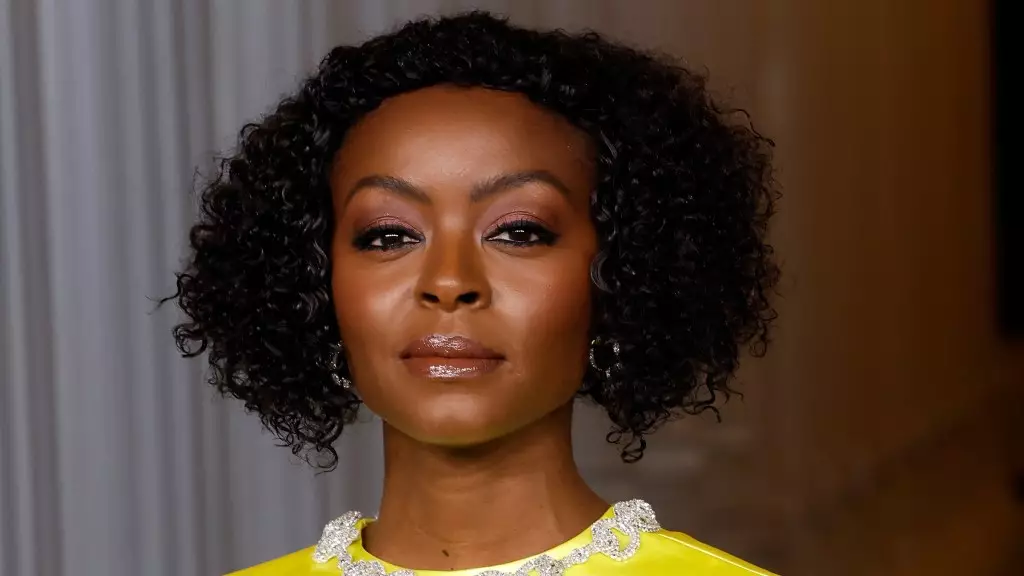Danielle Deadwyler, a name now resonating within the realms of cinematic discussions, has navigated the often tumultuous waters of award season with grace and resilience. Having previously faced an unexpected snub by the Academy Awards for her compelling role in “Till,” Deadwyler now embraces a more collected mindset regarding accolades, particularly with her latest work in “The Piano Lesson.” In her recent interview with the Los Angeles Times, she articulated a refreshing perspective that emphasizes the importance of community and cultural connection over individual recognition.
“I’m relaxed about it,” she reflected, suggesting that her outlook on awards has evolved significantly. Rather than obsessing over accolades, Deadwyler focuses on the collaborative nature of filmmaking and the personal significance it holds for her and her peers. This philosophical shift reflects a broader, much-needed change in how artists, especially those from marginalized backgrounds, relate to the award-giving process.
Deadwyler’s journey comes at a time when the landscape of Hollywood is being critically examined, particularly regarding inclusivity and representation. Last year’s awards season sparked debates about the glaring omissions of several remarkable Black female creatives, like Gina Prince-Bythewood and Viola Davis, who were overlooked despite their groundbreaking contributions to cinema. Deadwyler herself placed her experience within this context, highlighting the intersection of race and gender in a space where recognition often feels performative rather than equitable.
She articulated a compelling argument when she described how “the abject nature of Blackness” plays into public perceptions of merit and acknowledgment. According to her, the exclusion of Black women from prestigious awards is not merely a failure of individual recognition; it underscores a systemic issue within the industry that warrants critical examination. The insistence on categorizing art and recognition can often overshadow the stories being told and the people sharing them.
With “The Piano Lesson,” Deadwyler stars alongside John David Washington in a film that’s deeply rooted in the nuances of family legacy and identity. The adaptation of August Wilson’s Pulitzer Prize-winning play marks a significant cultural statement, engaging audiences with the Black experience across multiple decades. As the film approaches its Netflix debut on November 22 after a limited theatrical release, it not only revives Wilson’s essential narratives but also allows viewers to dive into the complex dynamics of familial ties and historical burdens.
Deadwyler emphasized the ensemble aspect of filmmaking, stating, “It’s not about recognition individually.” This reiteration of the collective philosophy speaks volumes about her values as an artist. Drawing focus away from awards allows space for genuine interactions and connections, fostering an environment where storytelling can flourish unencumbered by the weight of external validation. This shift isn’t merely personal; it has the potential to reshape how audiences and industry members perceive and interact with art.
In light of her past experiences, Deadwyler advocates for a reevaluation of the structures that govern awards and recognition in Hollywood. Her belief that misconception and bias often cloud the artistic contributions of Black creators reveals a desire for the industry to undergo a comprehensive transformation. She posits that for true equity to be realized, there needs to be an openness to questioning longstanding norms around recognition and validation.
As “The Piano Lesson” prepares to spotlight a pivotal element of Black heritage, Deadwyler’s voice resonates as a call to action—not just for her peers, but for audiences to reflect on the stories they engage with, the creators behind them, and the systemic barriers that still exist. The conversation surrounding awards can remain present, but it shouldn’t overshadow the essence of storytelling itself. At its heart, the film encapsulates the complexities of heritage, memory, and the often tumultuous journey toward self-acknowledgment that resonates with many.
Danielle Deadwyler’s trajectory through the labyrinth of award seasons showcases her commitment to authenticity over acclaim. As she champions a decentered approach to recognition, her perspectives encourage a richer dialogue around culture, art, and the importance of elevating collective narratives that celebrate the human experience in all its intricacies.



Leave a Reply